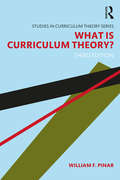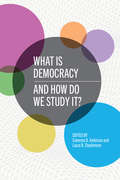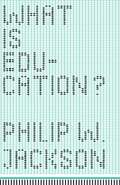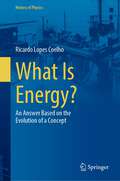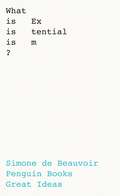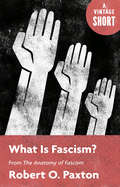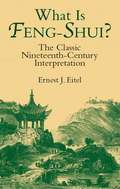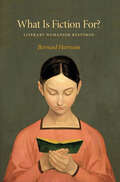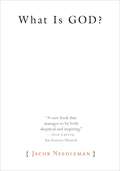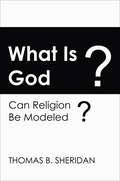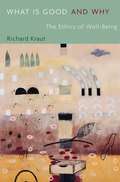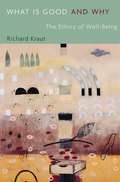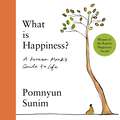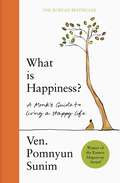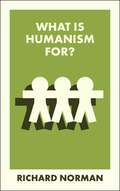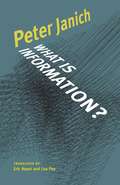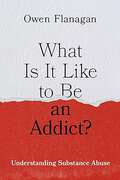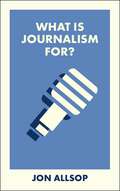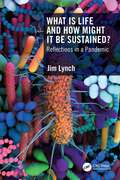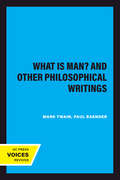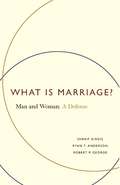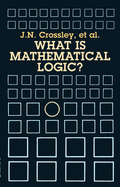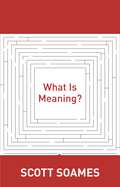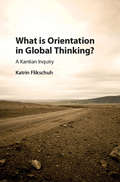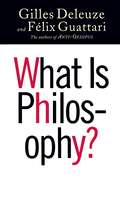- Table View
- List View
What Is Curriculum Theory? (Studies in Curriculum Theory Series)
by William F. PinarThis primer for prospective and practicing teachers asks students to question the historical present and their relation to it, and in so doing, reflect on their own understandings of what it means to teach, to study, to educate, and to become educated in the present moment in the places we inhabit. Not only the implementation of objectives to be assessed by standardized tests, curriculum is communication among older and younger generations, informed by academic knowledge, and characterized by educational experience. Pinar’s concept of currere–the Latin infinitive of curriculum–is invoked to provide an autobiographical method for self-study, enabling both individuals and groups to understand teaching as passionate participation in the complicated conversation that is the curriculum. New to the Third Edition: A new allegory-of-the-present: the Harlem Renaissance New section on technology New section on the future of curriculum Expanded section on Freedom Schools Educators depicted as truth-tellers in this "post-truth" era of "fake news" Provocative, compelling, and controversial, What Is Curriculum Theory? remains indispensable for scholars and students of curriculum studies, teacher education, educational policy, and the foundations of education.
What Is Democracy and How Do We Study It?
by Laura B. Stephenson Cameron D. AndersonThere are many different ways to do political science research. This book takes a core question that motivates research in political science – what is democracy? – and presents, in a single volume, original research demonstrating a variety of approaches to studying it. The approaches and related methods covered by the chapters in this book include normative political theory, positivist quantitative analysis, behaviouralism, critical theory, post-structuralism, historical institutionalism, process tracing, case studies, and literature reviews. Readers are confronted with the different assumptions that researchers make when entering the research process and can compare and contrast the many different ways that a single question can be studied . This book will be enlightening for students of democracy as well as those interested in research design and methodological approaches.
What Is Education?
by Philip W. JacksonOne day in 1938, John Dewey addressed a room of professional educators and urged them to take up the task of “finding out just what education is.” Reading this lecture in the late 1940s, Philip W. Jackson took Dewey’s charge to heart and spent the next sixty years contemplating his words. The stimulating result of a lifetime of thinking about educating, What Is Education? is a profound philosophical exploration of how we transmit knowledge in human society and how we think about accomplishing that vital task. Most contemporary approaches to education follow a strictly empirical track, aiming to discover pragmatic solutions for teachers and school administrators. Jackson argues that we need to learn not just how to improve on current practices but also how to think about what education means—in short, we need to answer Dewey by constantly rethinking education from the ground up. Guiding us through the many facets of Dewey’s comments, Jackson also calls on Hegel, Kant, and Paul Tillich to shed light on how a society does, can, and should transmit truth and knowledge to successive generations. Teasing out the implications in these thinkers’ works ultimately leads Jackson to the conclusion that education is at root a moral enterprise. At a time when schools increasingly serve as a battleground for ideological contests, What Is Education? is a stirring call to refocus our minds on what is for Jackson the fundamental goal of education: making students as well as teachers—and therefore everyone—better people.
What Is Energy?: An Answer Based on the Evolution of a Concept (History of Physics)
by Ricardo Lopes CoelhoThis book provides a solution to the problem with the energy concept. This problem manifests itself in the fact that physicists clearly diverge regarding the question of what energy is. Some define it but others state that we do not know what it is. Although this is a problem for physicists who need to explain the concept, it is not a problem for physics that can be solved by laboratory means. Penetrating into the origin of the notion of energy, this book offers a clear idea of what was discovered and what was invented to interpret the findings.Following the development of the concept, it provides an explanation of the trends in contemporary textbooks. The author's repetition, in his "History and Philosophy of Physics Laboratory", of Joule’s famous experiment – the paddle wheel experiment – with a calorimeter as originally used by Joule and with a calorimeter as proposed in textbooks, is presented, yielding new insight into the phenomenon. Thus, science teachers and students will benefit from reading the book as well as historians, philosophers, students of the history and philosophy of science, and all who are interested in knowing about what it is that we call energy.
What Is Existentialism? (Penguin Great Ideas)
by Simone de Beauvoir'It is possible for man to snatch the world from the darkness of absurdity'How should we think and act in the world? These writings on the human condition by one of the twentieth century's great philosophers explore the absurdity of our notions of good and evil, and show instead how we make our own destiny simply by being.One of twenty new books in the bestselling Penguin Great Ideas series. This new selection showcases a diverse list of thinkers who have helped shape our world today, from anarchists to stoics, feminists to prophets, satirists to Zen Buddhists.
What Is Fascism?: from The Anatomy of Fascism (A Vintage Short)
by Robert PaxtonBased on a lifetime’s worth of research, esteemed historian Robert Paxton explores what fascism is and how it has come to have a lasting and continued impact on our history. In the concluding section of his authoritative book, The Anatomy of Fascism, Paxton makes the convincing and radical case that existing definitions of the popular, nationalist, and conservative political view are lacking, and offers up his own brilliant explication—drawn from concrete historical actions—thus transforming our understanding of this dangerous ideology and of why it takes hold when and where it does. A Vintage Shorts Selection. An ebook short.
What Is Feng-Shui?: The Classic Nineteenth-Century Interpretation
by Ernest J. EitelBased on principles of cooperation between humans and nature, feng-shui promotes a form of living in harmony with the landscape that is reputed to enhance the attractiveness of buildings and the well-being of their inhabitants. Ernest J. Eitel, a missionary who worked in China, learned firsthand about this ancient oral tradition and its philosophical roots, which span a range of thought from Taoism and Buddhism to ancient rural magic. In 1873, Eitel published the first book on feng-shui, introducing Westerners to the principled but highly flexible code for arranging living quarters to achieve optimal comfort for mind and body.
What Is Fiction For?: Literary Humanism Restored
by Bernard HarrisonHow can literature, which consists of nothing more than the description of imaginary events and situations, offer any insight into the workings of "human reality" or "the human condition"? Can mere words illuminate something that we call "reality"? Bernard Harrison answers these questions in this profoundly original work that seeks to re-enfranchise reality in the realms of art and discourse. In an ambitious account of the relationship between literature and cognition, he seeks to show how literary fiction, by deploying words against a background of imagined circumstances, allows us to focus on the roots, in social practice, of the meanings by which we represent our world and ourselves. Engaging with philosophers and theorists as diverse as Wittgenstein, Sartre, Merleau-Ponty, Foucault, Derrida, F. R. Leavis, Cleanth Brooks, and Stanley Fish, and illustrating his ideas through readings of works by Swift, Woolf, Appelfeld, and Dickens, among others, this book presents a systematic defense of humanism in literary studies, and of the study of the Humanities more generally, by a distinguished scholar.
What Is God?
by Jacob NeedlemanIn his most deeply personal work, religious scholar Needleman cuts a clear path through today's clamorous debates over the existence of God, illuminating an entirely new way of approaching the question of how to understand a higher power. I n this new book, philosopher Jacob Needleman- whose voice and ideas have done so much to open the West to esoteric and Eastern religious ideas in the twentieth and twenty-first centuries-intimately considers humanity's most vital question: What is God? Needleman begins by taking us more than a half century into the past, to his own experience as a brilliant, promising, Ivyeducated student of philosophy-atheistic, existential, and unwilling to blindly accept childish religiosity. But an unsettling meeting with the venerated Zen teacher D. T. Suzuki, combined with the sudden need to accept a dreary position teaching the philosophy of religion, forced the young academician to look more closely at the religious ideas he had once thought dead. Within traditional religious texts the scholar discovered a core of esoteric and philosophical ideas, more mature and challenging than anything he had ever associated with Judaism, Christianity, and the religions of the East. At the same time, Needleman came to realize-as he shares with the reader-that ideas and words are not enough. Ideas and words, no matter how profound, cannot prevent hatred, arrogance, and ultimate despair, and cannot prevent our individual lives from descending into violence and illusion. And with this insight, Needleman begins to open the reader to a new kind of understanding: The inner realization that in order to lead the lives we were intended for, the very nature of human experience must change, including the very structure of our perception and indeed the very structure of our minds. In What Is God?, Needleman draws us closer to the meaning and nature of this needed change-and shows how our present confusion about the purpose of religion and the concept of God reflects a widespread psychological starvation for this specific quality of thought and experience. In rich and varied detail, the book describes this inner experience-and how almost all of us, atheists and "believers" alike, actually have been visited by it, but without understanding what it means and why the intentional cultivation of this quality of experience is necessary for the fullness of our existence.
What Is God?: Can Religion Be Modeled?
by Thomas B. SheridanAn eminent psychologist and engineer presents a provocative analysis of the concept of God through the lens of scientific inquiry.This is a study of the concept of God, not from the perspective of any religious tradition, but as a pervasive social phenomenon that has prevailed through the ages. An expert in engineering and applied psychology, author Thomas B. Sheridan offers unique perspective on the subject. In What Is God?, he asks whether the concept of God can be modeled in denotative language (much as modeling in science, medicine and modern professions) in contrast to connotative language (e.g., myth, metaphor, art and music). Sheridan adopts the assumption of model-based reality, as currently prevalent in physics and some branches of philosophy. That criterion means an entity can be called real for public discourse purposes only to the extent that a credible model can be made of what the entity is or how it works—as opposed to the private reality of thoughts, perceptions, or dreams. What follows is a truly provocative and enlightening through experiment with far-reaching implications.“It is rare to see the ultimate question of God as prime mover examined as a problem open to rigorous scientific inquiry. Thomas Sheridan has now done it with admirable clarity.” —Edward O. Wilson, Pulitzer Prize winning author of The Meaning of Human Existence
What Is Good and Why: The Ethics of Well-Being
by Richard KrautWhat is good, how do we know, and how important is it? Kraut reorients these questions around the notion of what causes human beings to flourish. Extending his argument to include plants and animals, Kraut applies a general principle to the entire living world: what is good for complex organisms consists in the exercise of their natural powers.
What Is Good and Why: The Ethics of Well-being
by Richard KrautWhat is good? How can we know, and how important is it? In this book Richard Kraut, one of our most respected analytical philosophers, reorients these questions around the notion of what causes human beings to flourish--that is, what is good for us. Observing that we can sensibly talk about what is good for plants and animals no less than what is good for people, Kraut advocates a general principle that applies to the entire world of living things: what is good for complex organisms consists in the maturation and exercise of their natural powers.
What Is Happiness: A Korean Monk's Guide to Life
by Pomnyun Sunim'When I ask people, "Are you happy?" in my talks, very few people say yes.'There are many things that seem to prevent us from being happy in our lives. Usually, things don't turn out the way we want them to. It could be unfulfilled goals, bad habits, a society that's built to benefit only those at the very top, or the loops of self-deprecation that many of us find ourselves falling into. But we can take control of our happiness, whatever life throws at us. We all have the right, and the ability, to be happy regardless of our situation.With his simple yet profound teachings, Buddhist monk Pomnyun Sunim shows us how to combat day-to-day anxiety, insecurity, anger, and discouragement. He explains why humans are prone to self-destruction, and redirects our focus to finding happiness.This book has touched countless lives and uplifted spirits in Korea, and it's time for the rest of the world to experience and understand exactly what is happiness.
What Is Happiness: A Monk's Guide to a Happy Life
by Pomnyun Sunim'When I ask people, "Are you happy?" in my talks, very few people say yes.'There are many things that seem to prevent us from being happy in our lives. Usually, things don't turn out the way we want them to. It could be unfulfilled goals, bad habits, a society that's built to benefit only those at the very top, or the loops of self-deprecation that many of us find ourselves falling into. But we can take control of our happiness, whatever life throws at us. We all have the right, and the ability, to be happy regardless of our situation.With his simple yet profound teachings, Buddhist monk Pomnyun Sunim shows us how to combat day-to-day anxiety, insecurity, anger, and discouragement. He explains why humans are prone to self-destruction, and redirects our focus to finding happiness.This book has touched countless lives and uplifted spirits in Korea, and it's time for the rest of the world to experience and understand exactly what is happiness.
What Is Humanism For? (What Is It For?)
by Richard NormanReligious belief is declining in many parts of the world, yet people still seek purpose in their lives and guidance on how to navigate life’s challenges. Humanism is a broad tradition of thought and action which encourages thinking for yourself about what to believe and accommodating diversity. What is the purpose of humanism in an increasingly secular world? Written by a pre-eminent authority in this field, this book shows how humanism’s purpose is to help people to meet their need to understand the world around them. Given the growing demand for humanist funerals, weddings and baby naming ceremonies, it will help both existing adherents and the “humanism-curious” to contextualise its potential role in making sense of their lives.
What Is Information?: A Mythological Critique (Electronic Mediations #55)
by Peter JanichA novel way of looking at information challenges longstanding dogmas—from a preeminent German thinker It is widely agreed that we live in an &“information age,&” but what exactly is information? This small, seemingly facile question is in fact surprisingly difficult, and it has occupied many of the best philosophical minds of the modern age. In this wholly original addition to the quest to understand information, German philosopher Peter Janich argues that our understanding of information is based in the much broader history of scientific naturalism—the belief that science is a fundamental aspect of the world and not a human contrivance. His novel critique of this widespread dogma grounds science in human life practices and wrestles with the very fundamentals of the scientific way of understanding reality.Offering new perspectives on the major contemporary fields of communications technology, neurobiology, and artificial intelligence, What Is Information? provides a deep look into humanity in an information age. Its arguments show ways of reconciling the sciences and the humanities, shining new light on the relationship of science to the natural world.
What Is It Like to Be an Addict?: Understanding Substance Abuse
by Owen FlanaganA powerful and important exploration of how addiction functions on social, psychological and biological levels, integrated with the experience of being an addict, from an acclaimed philosopher and former addict. <P><P> What is addiction? Theories about what kind of thing addiction is are sharply divided between those who see it purely as a brain disorder, and those who conceive of it in psychological and social terms. Owen Flanagan, an acclaimed philosopher of mind and ethics, offers a state-of-the-art assessment of addiction science and proposes a new ecumenical model for understanding and explaining substance addiction. <P><P> Flanagan has first-hand knowledge of what it is like to be an addict. That experience, along with his wide-ranging knowledge of the philosophy of mind, psychology, neuroscience, and the ethics and politics of addiction, informs this important and novel work. He pairs the sciences that study addiction with a sophisticated view of the consciousness-brain/body relation to make his core argument: that substance addictions comprise a heterogeneous set of "psychobiosocial" behavioral disorders. He explains that substance addictions do not have one set of causes, such as self-medication or social dislocation, and they do not have one neural profile, such as a dysfunction in dopamine system. Some addictions are fun and experimentation gone awry. Flanagan reveals addiction to be a heterogeneous set of disorders, which are picked out by multifarious cultural, social, psychological, and neural features. <P><P> Flanagan explores the ways addicts sensibly insist on their own responsibility to undo addiction, as well as ways in which shame for addiction can be leveraged into healing. He insists on the collective shame we all bear for our indifference to many of the psychological and social causes of addiction and explores the implications of this new integrated paradigm for practices of harm reduction and treatment. Flanagan's powerful new book upends longstanding conventional thinking and points the way to new ways of understanding and treating addiction.
What Is Journalism For? (What Is It For?)
by Jon AllsopWhat is at stake when journalism is threatened? Does society still need journalists? Journalism faces multiple threats today all over the world: economic decline, online disinformation, the rise of AI, authoritarian curbs on freedom of the press, and violence against journalists. In such a climate, it’s more urgent than ever to ask what journalism is for. Drawing on his experience as a journalist and media commentator, and on interviews with journalists from the US to Myanmar, Jon Allsop examines key concepts that constitute journalism’s role: good judgement, concern for truth and critical scrutiny of one or more communities. Along the way, he also considers the relationship between journalism and activism; whether journalists should aspire to change the world and whether they can be seen as champions of democracy.
What Is Life and How Might It Be Sustained?: Reflections in a Pandemic
by Jim LynchHow did the universe and life begin and what are the threats to people and the environment in a pandemic? This book is for anybody with interest in protecting life on the planet. Studies on the origin of life and scientific contributions to safeguarding the planet are examined in light of current thinking on climate change. A major focus is the spread of microbes, put in the context of environmental assessment and management, including descriptions of microbiomes and a consideration of the risks of genetic modifications. Professor Lynch shows how failure to control disease can lead to the collapse of any biotic population. To avoid this, the ethics of management of disease by biological control and by vaccination are discussed, at the practical level and in a moral theological context.
What Is Man? and Other Philosophical Writings (The Works of Mark Twain #19)
by Mark TwainThe volume includes Mark Twain's previously published philosophical writing. Fictional pieces (even some which develop arguments contained here) are ordinarily excluded, as are other works appropriate to different volumes in this edition. However, "Letter from the Recording Angel," "The Five Boons of Life," and "Letters from the Earth," although they are in a strict sense fictional, have been judged more relevant to the present volume that to the volumes of short fiction. "Things a Scotsman Wants to Know," previously unpublished, is included by agreement with the editor of The Mark Twain Papers, as being especially relevant to themes of this volume. Other unpublished items appear as supplements because of their close relation to What Is Man?, Christian Science, and " 'The Turning Point of My Life.' " The two works that break off with unfinished sentences, "Bible Teaching and Religious Practice" and the introductory section of "Letters from the Earth," were abandoned by the author or else their endings have been lost. The order of works in this volume is according to date of publication or, for those unpublished during the author's lifetime, date of composition. For works published during his lifetime, dates of first publication appear in roman type below titles; for works first published after his death, date are in italics and indicate time of composition.
What Is Marriage?
by Robert P George Ryan T Anderson Sherif GirgisUntil yesterday, no society had seen marriage as anything other than a conjugal partnership: a male-female union. What Is Marriage? identifies and defends the reasons for this historic consensus and shows why redefining civil marriage is unnecessary, unreasonable, and contrary to the common good.Originally published in the Harvard Journal of Law and Public Policy, this book's core argument quickly became the year's most widely read essay on the most prominent scholarly network in the social sciences. Since then, it has been cited and debated by scholars and activists throughout the world as the most formidable defense of the tradition ever written. Now revamped, expanded, and vastly improved, What Is Marriage? stands poised to meet its moment as few books of this generation have.Rhodes Scholar Sherif Girgis, Heritage Foundation Fellow Ryan T. Anderson, and Robert P. George offer a devastating critique of the idea that equality requires redefining marriage. They show why both sides must first answer the question of what marriage really is. They defend the principle that marriage, as a comprehensive union of mind and body ordered to family life, unites a man and a woman as husband and wife, and they document the social value of applying this principle in law.Most compellingly, they show that those who embrace same-sex civil marriage leave no firm ground-none-for not recognizing every relationship describable in polite English, including polyamorous sexual unions, and that enshrining their view would further erode the norms of marriage, and hence the common good.Finally, What Is Marriage? decisively answers common objections: that the historic view is rooted in bigotry, like laws forbidding interracial marriage; that it is callous to people's needs; that it can't show the harm of recognizing same-sex couplings, or the point of recognizing infertile ones; and that it treats a mere "social construct" as if it were natural, or an unreasoned religious view as if it were rational.If the marriage debate in America is decided soon, it will be with this book's help or despite its powerful arguments.
What Is Mathematical Logic? (Dover Books on Mathematics)
by J. N. Crossley J. C. Stillwell C. J. Brickhill C. J. AshAlthough mathematical logic can be a formidably abstruse topic, even for mathematicians, this concise book presents the subject in a lively and approachable fashion. It deals with the very important ideas in modern mathematical logic without the detailed mathematical work required of those with a professional interest in logic.The book begins with a historical survey of the development of mathematical logic from two parallel streams: formal deduction, which originated with Aristotle, Euclid, and others; and mathematical analysis, which dates back to Archimedes in the same era. The streams began to converge in the seventeenth century with the invention of the calculus, which ultimately brought mathematics and logic together. The authors then briefly indicate how such relatively modern concepts as set theory, Gödel's incompleteness theorems, the continuum hypothesis, the Löwenheim-Skolem theorem, and other ideas influenced mathematical logic. The ideas are set forth simply and clearly in a pleasant style, and despite the book's relative brevity, there is much covered on these pages. Nonmathematicians can read the book as a general survey; students of the subject will find it a stimulating introduction. Readers will also find suggestions for further reading in this lively and exciting area of modern mathematics.
What Is Meaning? (Soochow University Lectures in Philosophy #4)
by Scott SoamesThe tradition descending from Frege and Russell has typically treated theories of meaning either as theories of meanings (propositions expressed), or as theories of truth conditions. However, propositions of the classical sort don't exist, and truth conditions can't provide all the information required by a theory of meaning. In this book, one of the world's leading philosophers of language offers a way out of this dilemma. Traditionally conceived, propositions are denizens of a "third realm" beyond mind and matter, "grasped" by mysterious Platonic intuition. As conceived here, they are cognitive-event types in which agents predicate properties and relations of things--in using language, in perception, and in nonlinguistic thought. Because of this, one's acquaintance with, and knowledge of, propositions is acquaintance with, and knowledge of, events of one's cognitive life. This view also solves the problem of "the unity of the proposition" by explaining how propositions can be genuinely representational, and therefore bearers of truth. The problem, in the traditional conception, is that sentences, utterances, and mental states are representational because of the relations they bear to inherently representational Platonic complexes of universals and particulars. Since we have no way of understanding how such structures can be representational, independent of interpretations placed on them by agents, the problem is unsolvable when so conceived. However, when propositions are taken to be cognitive-event types, the order of explanation is reversed and a natural solution emerges. Propositions are representational because they are constitutively related to inherently representational cognitive acts. Strikingly original, What Is Meaning? is a major advance.
What Is Orientation in Global Thinking?: A Kantian Inquiry
by Katrin FlikschuhStarting from Kant's striking question 'What is orientation in thinking?', this book argues that the main challenge facing global normative theorising lies in its failure to acknowledge its conceptual inadequacies. We do not know how to reason globally; instead, we tend to apply our domestic political experiences to the global context. Katrin Flikschuh argues that we must develop a form of global reasoning that is sensitive to the variability of contexts: rather than trying to identify a uniquely shareable set of substantive principles, we need to appreciate and understand local reasons for action. Her original and incisive study shows how such reasoning can benefit from the open-ended nature of Kant's systematic but non-dogmatic philosophical thinking, and from reorientation from a domestic to a non-domestic frame of thought. It will appeal to all those interested in global moral issues, as well as to Kant scholars.
What Is Philosophy?
by Gilles Deleuze Félix GuattariCalled by many France's foremost philosopher, Gilles Deleuze is one of the leading thinkers in the Western World. His acclaimed works and celebrated collaborations with Félix Guattari have established him as a seminal figure in the fields of literary criticism and philosophy. The long-awaited publication of What is Philosophy? in English marks the culmination of Deleuze's career.<P><P> Deleuze and Guattari differentiate between philosophy, science, and the arts, seeing as means of confronting chaos, and challenge the common view that philosophy is an extension of logic. The authors also discuss the similarities and distinctions between creative and philosophical writing. Fresh anecdotes from the history of philosophy illuminate the book, along with engaging discussions of composers, painters, writers, and architects.<P> A milestone in Deleuze's collaboration with Guattari, What is Philosophy? brings a new perspective to Deleuze's studies of cinema, painting, and music, while setting a brilliant capstone upon his work.
